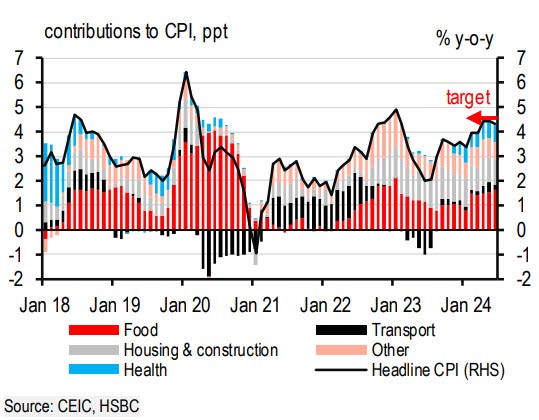HCMC – Vietnam’s inflation might have reached its peak in June, driven by rising pork prices due to African swine fever (ASF), according to a recent HSBC report.
Headline inflation rose by 0.2% month-over-month in June, resulting in a year-over-year figure of 4.3%. While monthly oil prices dropped and provided some relief, this was more than offset by rising pork prices due to the ongoing ASF outbreak that began early this year.
ASF has led to the culling of almost 10,000 pigs, equivalent to 40% of the national pig population. The Ministry of Agriculture and Rural Development (MARD) has urged four provinces to combat ASF.
Historically, volatility in pork prices has sharply fueled inflation, often exceeding the State Bank of Vietnam’s (SBV) targets. However, barring the further spread of ASF, inflation is expected to moderate to a little above 3% on average in the second half of 2024, bringing the yearly average to 3.6%, according to HSBC’s updated forecast in its “Vietnam at a Glance” report.
Despite inflation concerns, the report highlights unexpected economic growth in the second quarter of 2024, with GDP surpassing market expectations at 6.9% year-over-year.
As a result, HSBC forecasters are now predicting full-year growth of 6.5%, an upward revision from the previous estimate of 6%.
The second-quarter growth was driven by a recovery in various sectors, notably technology and tourism. Over 8.8 million tourists visited Vietnam in the first half of the year. Despite these gains, domestic sectors continue to lag, a trend expected to persist into the final quarter of the year.
The manufacturing sector grew by 10% over the same period last year, with second-quarter exports rising by 15%. The electronics sector led this recovery, while non-electronics exports, such as textiles and footwear, also showed strong growth. The June Purchasing Managers’ Index (PMI) rose to 54.7, the highest in two years, indicating increased manufacturing sentiment.
Foreign direct investment (FDI) in Vietnam remains robust, particularly in manufacturing. New FDI pledges reached nearly US$10 billion in the first six months, equivalent to 4% of GDP. Investment from ASEAN countries, especially Singapore, has been significant, making Singapore Vietnam’s largest FDI provider, with plans to invest heavily in manufacturing supply chains.
Tourism-related services have continued to perform well, with Vietnam surpassing its 2019 tourist levels. However, retail sales have not yet returned to the pre-pandemic levels. The National Assembly has extended a VAT cut to support the domestic sector, aiming to close this gap by the end of the year.
Given the strong performance in the first half of 2024, Vietnam’s yearly GDP growth forecast has been upgraded to 6.5%, positioning Vietnam to be the fastest-growing economy in ASEAN.
However, the continuation of the trade recovery and its impact on the domestic sector will be crucial factors to monitor, HSBC noted.









